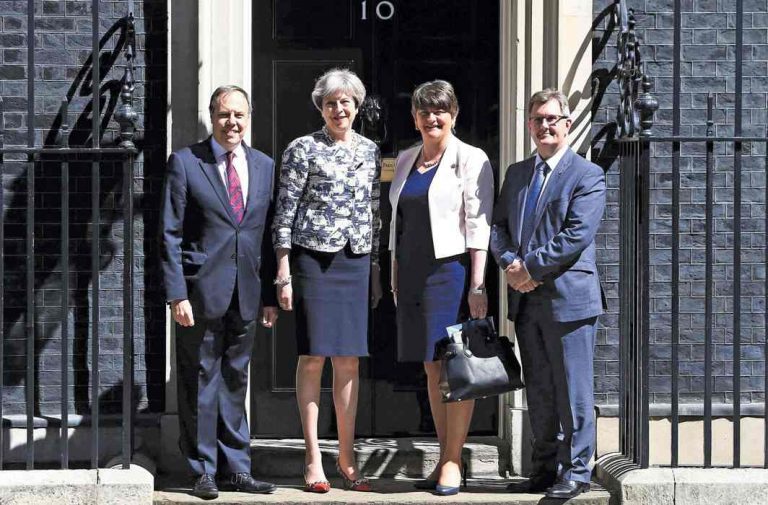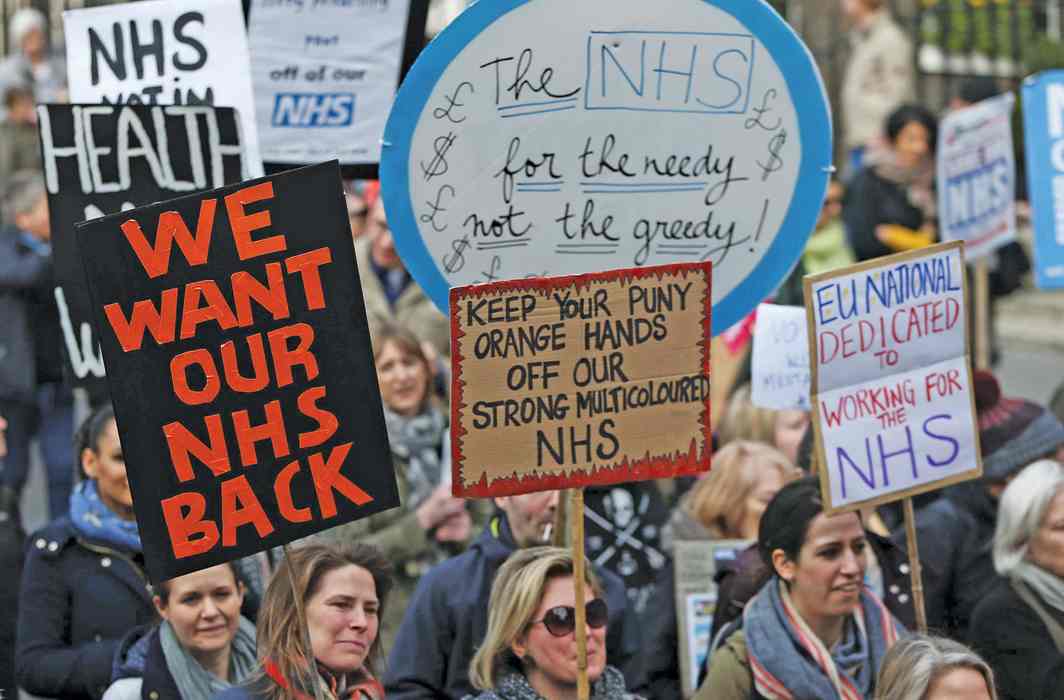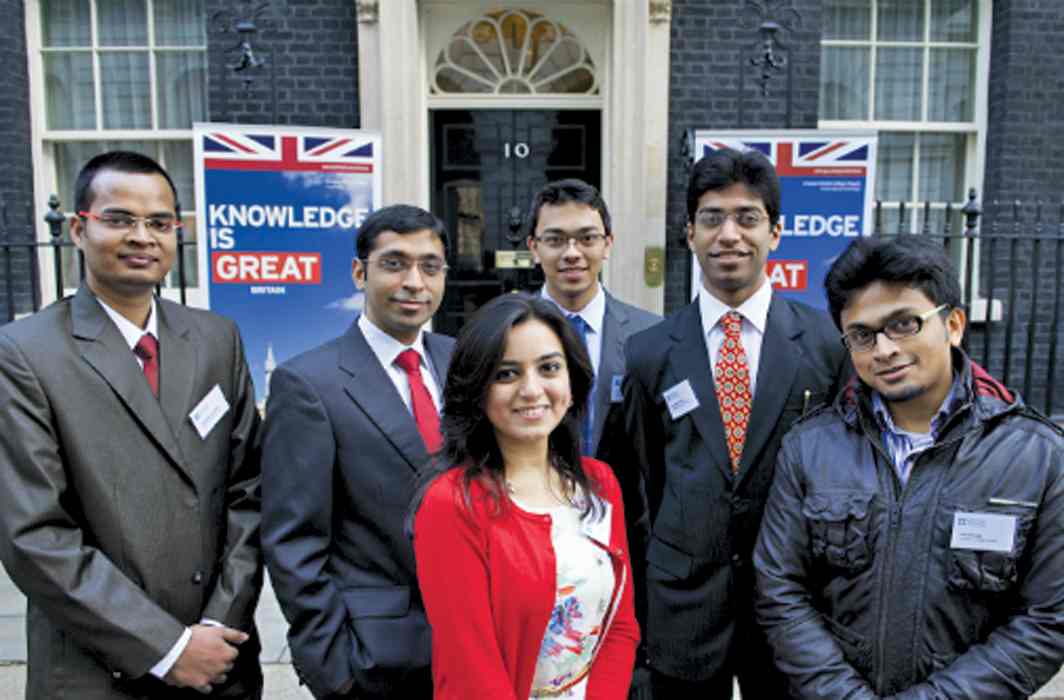
Above: PM Theresa May with DUP Leader Arlene Foster, Deputy Leader Nigel Dodds and Chief Whip Jeffrey Donaldson. Photo: UNI
The knives are already out for the British PM who secured her government with a one-billion-pound deal with the DUP of Northern Ireland. It is a matter of time before her party revolts against her
~By Sajeda Momin in London
Theresa May is living on borrowed time. The knives are out in the Conservative Party and any day now, her party MPs will force her to step down as prime minister, taking responsibility for the election debacle because of which a perfectly good majority government was reduced to a minority.
May had opportunistically announced a snap poll—something she had promised she would not do when she took over from her predecessor after losing the Brexit referendum in June last year. She did so in order to strengthen her position, both in the party and as prime minister.
Throughout the election campaign, May repeatedly told voters that “every vote for me and my team will strengthen my hand in the Brexit negotiations”, but she gambled away her majority, weakening her hand in the Commons and in the Tory party.

Reducing the Conservative Party’s MPs from 330 to only 318 in a House of 650, May missed the magical majority mark of 326. A subdued May was determined to hold on to power and by cutting a deal with the Democratic Unionist Party (DUP) of Northern Ireland, she garnered the support of another 10 MPs and finally cleared the Queen’s Speech in the House of Commons on June 29, 20 days after the election.
” font_container=”tag:p|font_size:20px|text_align:left|color:%23000000″ google_fonts=”font_family:Open%20Sans%3A300%2C300italic%2Cregular%2Citalic%2C600%2C600italic%2C700%2C700italic%2C800%2C800italic|font_style:700%20bold%20regular%3A700%3Anormal”]
After protracted negotiations with the right-wing DUP, May has temporarily secured their support for the price of one billion pounds. “This means the DUP will support the Conservative government on votes on the Queen’s Speech, the budget, and legislation relating to Brexit and national security,” explained May after confirming that she has entered into a deal with DUP leader Arlene Foster.
May’s insistance on bringing net migration down to below 1,00,000 per annum has led to increased hardships for Indian students and job-seekers
The DUP are fervent supporters of Brexit and hold a hardline on some social issues, including refusing to budge on liberalizing abortion or allowing gay marriage. Foster has said immediately after the referendum that “no-one wants to see a hard Brexit” and has also spoken about the need to avoid a hard border with the Republic of Ireland. “What we want to see is a workable plan to leave the European Union, and that’s what the national vote was about—therefore we need to get on with that,” she had said.
Rising Islamophobia
As Britain tackles hate crimes it also becomes the first country in the world to declare an attack solely on Muslims as an act of terrorism
Britain has earned a dubious distinction. It has become the first country in the world to declare an attack on Muslims as an act of terrorism. The attack took place on 19th June in London’s Finsbury Park where the victims were all Muslims who were leaving a mosque after evening prayers during the holy month of Ramazan. Borrowing tactics from Isis, a 47-year-old white man drove into groups of men emerging from the Muslim Welfare House mosque. Darren Osborne was later caught by some of the worshippers as he tried to flee and handed over to the police.
Normally, an attack on Muslims would have been passed off as a ‘hate-crime’ while an attack by a Muslim or Muslims would be called a ‘terror attack’. However pressure from civil society has forced a weakened Theresa May government to officially declare the attack on Muslims a ‘terror attack’ too. Immediately after the incident, the Indian-origin Deputy Assistant Commissioner of the Metropolitan Police Neil Basu said “No matter what the motivation proves to be….this is being treated as a terrorist attack and the Counter Terrorism Command is investigating”. Basu is the senior national coordinator for counter terrorism in the UK.
Prime Minister May denounced the assault as an act of “hatred” and “evil” against innocent civilians, just as she had after the attacks by radicalised Muslims in Westminster, Manchester and London Bridge some days earlier. The word ‘terrorism’ is defined in the Oxford English Dictionary as “the unlawful use of violence and intimidation, especially against civilians, in the pursuit of political aims”. However, after the attack on the twin towers in New York in 2001 by Al Qaida, the word ‘terrorism’ was only attached to assaults by Islamic groups, but not to atrocities committed by other groups. Right-wing, Islamophobic groups also propagated the phrase “Not all Muslims are terrorists, but all terrorists are Muslims”.
The present definition of terrorism used in the UK legal system is to be found in Section 1 of the Terrorism Act 2000 which describes it as “the use or threat of action designed to influence the government or to intimidate the public or a section of the public for the purpose of advancing a political, religious or ideological cause”. So far all the ‘Islamist’ terrorists who have carried out attacks on British soil have been either suicide bombers or killed by police when trying to capture them. Be it the four suicide bombers of the 7/7 London transport attacks of 2005 or the Manchester bomber of 22 May this year, or the Westminster and London Bridge attacks, all the terrorists have been killed.
Osborne, a father of four who lives in Cardiff in Wales, becomes the first terrorist in UK to be captured alive in recent times. He has been charged with terrorism related murder and attempted murder.
Witnesses who dragged Osborne out of the van said he told them: “I want to kill Muslims…you deserve it…I did my bit”. Osborne lived in Cardiff and his Muslim neighbours said he had been friendly, but his attitude had changed in recent weeks, particularly after the London Bridge attack. He began to hurl abuses at Muslims including a Indian neighbour’s 12-year-old son.
Over the last decade white supremacist groups like the British National Party (BNP) and English Defence League (EDL) have been very active stirring up hatred against all immigrants particularly Muslims. It was also these groups which teamed up with the right-wing United Kingdom Independence Party (UKIP) to push through a Leave vote during the Brexit referendum playing up on peoples’ irrational fear of immigrants.
In the wake of the three earlier terror strikes, white-extremist groups have been circulating
Islamophobic videos on social media. Katie Hopkins, a particularly rabid columnist with the Daily Mail tweeted “Western men. These are your wives. Your daughters. Your sons. Stand up. Rise up. Demand action. Do not carry on as normal. Cowed” after the Manchester attack.
After the mosque attack, one of the most prominent faces to react to Hopkins was Harry Potter author J.K. Rowling who tweeted “Again: Let’s talk about how the Finsbury Park terrorist was radicalized”, pointing to the Islamophobia egged on by some sections of the media.
In the week after the London Bridge attack the Metropolitan Police recorded 120 Islamophobic incidents as opposed to 36 in the previous week. “Rampant Islamophobia has been on the rise for a number of years and those on the far right have perpetuated hatred against Muslims. They should be called out for their hatred,” said Mohammed Shafiq of the Ramadan Foundation.
Finsbury Park and the borough of Islington, much like the rest of London, is a multi-cultural area with people of all nationalities, faiths and races living together for decades. It was the horrified reactions of the non-Muslim members of the community which pressured the government into treating the mosque attack as the same as the other terror attacks.
—Sajeda Momin
Critics of the billion-pound package given to the DUP have come down heavily on May for giving away so much to hold on to power. “If the PM can pay money to Northern Ireland to prop up her government for two years, she must now do the same for the rest of the union,” wrote political commentator Simon Jenkins. May now has to explain to a public already tired of austerity and demanding more investment in the National Health Service and education how she was able to find money to give to the DUP to save her government but not for the essential services they need. The governments of Scotland and Wales have already raised issue with the fact if May can give a billion pound worth of subsidies to the 1.8 million inhabitants of Northern Ireland, who already receive more financial support from the British taxpayer, then why can they not get more money to spend on their residents.
” font_container=”tag:p|font_size:20px|text_align:left|color:%23000000″ google_fonts=”font_family:Open%20Sans%3A300%2C300italic%2Cregular%2Citalic%2C600%2C600italic%2C700%2C700italic%2C800%2C800italic|font_style:700%20bold%20regular%3A700%3Anormal”]
May faces criticism even from within the Tory party over the deal she has signed with the DUP. Conservative MP Heidi Allen reflected their feelings when she said during the debate on the Queen’s Speech (which basically sets out the new government’s agenda) that she could “barely put into words her anger” at the one-billion-pound deal. Conservative MPs will have to face their constituencies in the next election and explain how at a time when the government was pleading austerity they found a “magical money tree” to hold on to power.

Thanks to the DUP support, Britain now has a government marginally more secure in seeing through the Brexit negotiations which began just last week. However, it is not going to be plain sailing for May. Despite being a Remainer during the referendum last year, May became a “hard Brexiteer” once she became prime minister. She insisted that “Brexit meant Brexit” and would not ease up on the issue of immigration—the reason why many Britons voted in favour of leaving the European Union. May, even as home secretary, had an immigration policy that promised to reduce the number of immigrants to the UK from all over the world, including India.
Over the last year, May has been insisting that she would bring net migration down to below 1,00,000 per annum, which she considers to be a sustainable level. In 2016, net migration to the UK was 2,48,000, a fall of 84,000 from 2015. This has certainly meant that immigration to Britain from India has fallen and if May has her way, it will continue to fall. Student and Employment visas for Indians have already become harder and a significant number of Indians are looking for greener pastures.
After having triggered Article 50 in March 2017 which basically sets the clock ticking for Britain’s exit, May was still adamant that she would not give in to the demand of free movement of people (ie, immigration) in return for allowing the UK to remain in the European single market. British businesses are extremely worried if they do not have preferential access to the EU market as it would raise costs in buying and selling abroad.
” font_container=”tag:p|font_size:20px|text_align:left|color:%23000000″ google_fonts=”font_family:Open%20Sans%3A300%2C300italic%2Cregular%2Citalic%2C600%2C600italic%2C700%2C700italic%2C800%2C800italic|font_style:700%20bold%20regular%3A700%3Anormal”]
At The Times annual CEO Summit last week, corporate Britain showed that it was becoming increasingly uneasy about what Brexit may bring. A poll asked delegates how confident they were about the UK economy and 46 percent said they were “not very confident”. Around 24 percent CEOs said they were “neutral”, 20 percent were “reasonably confident” and 10 percent “not confident at all”. Interestingly, not one delegate said they were “very confident”.
Critics of the billion-pound package given to the DUP have come down heavily on May for giving away so much to hold on to power.
A stronger Labour Party post-election has already been demanding that MPs have a greater say in the Brexit negotiations and are hoping that now they can influence a “softer Brexit”. There are also growing murmurs within the Conservative Party that May should change her approach to Brexit and soften the terms she seeks from the EU, but the prime minister is adamant that she will not compromise.

In fact, she has gone so far as to say that she would much rather come out of the EU with “no deal” as that is “better than a bad deal”. Without a trade agreement with EU, the UK would have to operate under World Trade Organization rules, which would mean customs checks and tariffs with a trading bloc in which it was once a member.
The DUP share May’s Brexit strategy and has committed to back her in any votes on Brexit, but they are said to be less keen on the no-deal route. Labour, on the other hand, insists that walking away with no deal must not be an option.
May has clearly said she wishes to remain prime minister to provide stability and certainty in the Brexit negotiations, but she is now weakened and vulnerable to being pushed about by MPs when it comes to a vote on any divorce deal. All it needs is for some Tory MP to challenge her leadership and that will be the end of May’s prime ministership and her political career—and that day is likely to come sooner rather than later.

